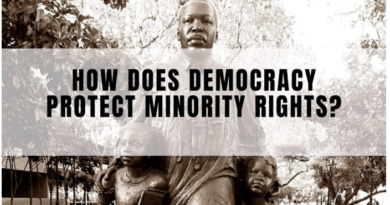What constitutes discrimination against the minority Groups
By Imanche Sunday |April 20, 2024
Protecting minority rights is essential for upholding equality and promoting social justice within a society. Minorities, whether based on race, ethnicity, religion, gender, or other characteristics, often face discrimination and injustice. Governments and institutions have a responsibility to ensure that the rights of all individuals, including those of minority groups, are respected and protected. This includes addressing systemic inequalities, promoting diversity and inclusion, and providing opportunities for marginalized communities to have a voice and representation in decision-making processes. Ultimately, safeguarding minority rights is crucial for creating a more just and inclusive society for everyone. Alexxis Johnson and her panelists argued about this crucial topic of what constitutes discrimination against the minority groups,
The topic of minority rights has been a subject of intense debate and discussion across various contexts. Let’s explore a few aspects related to this:
Colorism and Skin Bleaching: Colorism is a form of prejudice or discrimination based on skin color, often within the same racial or ethnic group. It can lead to favoritism or mistreatment based on the lightness or darkness of someone’s skin.
Skin bleaching is the practice of using various products or treatments to purposely lighten the skin in order to achieve a lighter complexion. It is often driven by internalized racism and societal pressure to conform to Eurocentric beauty standards.
Both colorism and skin bleaching can have harmful effects on individuals, perpetuating self-hatred, low self-esteem, and perpetuating inequality based on skin color. It is important to address and challenge these harmful practices and work towards promoting self-acceptance and celebrating diversity in all its forms.
Cultural Appropriation: Cultural appropriation is a term that refers to the adoption of elements of one culture by members of another culture, often without proper understanding or respect for the significance of those elements. This can sometimes be seen as disrespectful or harmful, especially when done without permission or understanding of the cultural context. Social media platforms play a significant role in shaping cultural narratives and sometimes contribute to appropriation. It is critical to engage in cultural exchange in a way that is considerate and grateful, and to be aware of and respectful of other people’s cultures and customs.
Representation in Media: Representation in media refers to the portrayal of various groups of people in movies, television, literature, and other forms of entertainment. It is important for individuals to see themselves accurately represented in media to ensure diversity, inclusivity, and authenticity. This includes representation of people from different ethnicities, genders, sexual orientations, abilities, and other marginalized or underrepresented communities. Media plays a significant role in shaping societal perceptions and attitudes, so it is crucial that diverse voices and perspectives are reflected in the content we consume.
Adequate representation of minorities in media is essential for combating stereotypes and promoting inclusivity.
Diverse voices and stories need to be amplified to create a more accurate and equitable portrayal of different communities.
Moving Forward: Addressing these issues requires collective effort. We must actively challenge biases, educate ourselves, and promote empathy.
Advocacy, policy changes, and fostering understanding can contribute to a more just and inclusive society.
These debates are ongoing, and several perspectives continue to evolve. thoughtful conversations to promote positive change should be engaged.


In order to address these difficulties, a collaborative effort is required. In order to actively combat biases, educate ourselves, and encourage empathy, we need to take action.
It is possible to contribute to a society that is more equitable and inclusive through advocacy, changes in policy, and the promotion of understanding.
These conversations are still going on, and a number of different points of view are still developing. It is important to engage in talks that are intelligent in order to encourage positive change.